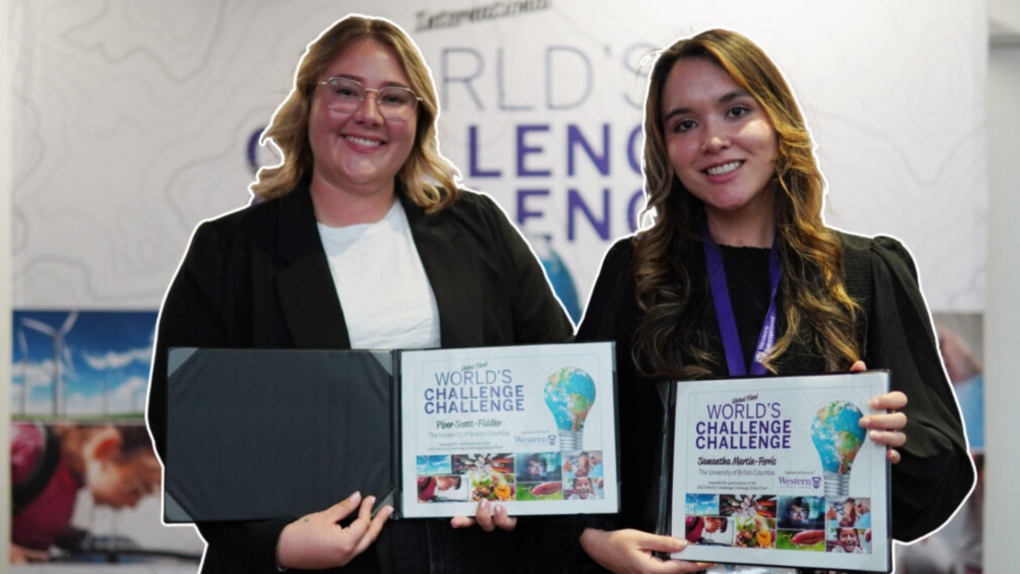New tool aims to improve access to sexual health care across Indigenous communities in B.C.
 UBC students Piper Scott-Fiddler and Samantha Sage Martin-Ferris hold up their award from the Western University's World's Challenge Challenge for the Lifegiver Box—a program geared towards the sexual wellbeing of Indigenous women. (UBC)
UBC students Piper Scott-Fiddler and Samantha Sage Martin-Ferris hold up their award from the Western University's World's Challenge Challenge for the Lifegiver Box—a program geared towards the sexual wellbeing of Indigenous women. (UBC)
A pair of university students in British Columbia have come up with a prize-winning solution to address unique health care challenges facing Indigenous communities.
Piper Scott-Fiddler and Samantha Sage Martin-Ferris are the brains behind the Lifegiver Box—a program geared towards the sexual wellbeing of Indigenous women—which recently won first place at Western University’s World’s Challenge Challenge.
Scott-Fiddler and Martin-Ferris are both earning their master’s degrees through UBC’s faculty of women+ and children’s health sciences, and were recently interviewed by their university about the $30,000-award-winning project.
“As Indigenous women, this is a greatly important project to us as it is a means of giving back to Indigenous communities by reducing systemic harm against Indigenous bodies,” Martin-Ferris said in a UBC release issued Tuesday.
She says the box was developed as an answer to the 2022 report The Scars We Carry, in which the Senate Committee on Human Rights acknowledged the forcible sterilization of Indigenous woman in Canada.
“Colonization and the systemic mistreatment of Indigenous people often results in them facing stigma when accessing health care, making them hesitant to use these services,” Scott-Fiddler explained.
“We are hopeful that the production of this collaborative box and open discussions about sexual health will help to re-establish trust and foster a more promising future.”
The duo worked with the First Nations Health Authority and elders to determine what would be contained in the boxes, based on the specific needs of different Indigenous communities.
Each box will include basic sexual health products that don’t require a doctor’s prescription—like condoms, tampons and pregnancy tests—plus traditional Indigenous medicines and educational pamphlets.
Over the next five years, Scott-Fiddler and Martin-Ferris are looking to establishing 26 different locations across B.C. where Indigenous people can access the Lifegiver Box.
The $30,000 prize money will help support that goal, but the pair also plans to apply for federal funding to improve access to their program.
They’re seeking input from Indigenous people on what to include in the box.
“We also ask that non-Indigenous health-care providers are supportive of Indigenous people’s access to health care and work to decolonize their spaces and practices for Indigenous people,” said Martin-Ferris.
CTVNews.ca Top Stories

Uninspired Canada upset by Latvia in a shootout at world juniors
Eriks Mateiko scored the only goal of the shootout as Latvia stunned an alarmingly uninspired Canada 3-2 at the world junior hockey championship Friday.
Trudeau, Carney push back over Trump's ongoing 51st state comments
Two senior members of the federal cabinet were in Florida Friday pushing Canada's new $1.3 billion border plan with members of Donald Trump's transition team, a day after Prime Minister Justin Trudeau himself appeared to finally push back at the president-elect over his social media posts about turning Canada into the 51st state.
B.C. man who flipped 14 homes in four years is fined $2M for tax evasion
A serial property flipper in British Columbia has been convicted of tax evasion and fined more than $2 million for failing to report nearly $7.5 million in earnings.
Calgary Boxing Day crash victim identified, mother and sister still in hospital
A nine-year-old girl has died in hospital after the vehicle she was in was struck by a driver in a stolen vehicle fleeing from police.
Missing dog returns to Florida family, rings doorbell
After a nearly weeklong search, Athena, a four-year-old German Shepherd and Husky mix, found her way home to her Florida family in time for Christmas Eve and even rang the doorbell.
'Home Alone' director Chris Columbus explains how the McCallisters were able to afford that house
Audiences have wondered for years how the family in 'Home Alone' was able to afford their beautiful Chicago-area home and now we know.
Scheffler to miss tournament after injuring hand making Christmas dinner
Scottie Scheffler will miss The Sentry tournament next month after the world number one suffered an accidental puncture wound to his right hand preparing Christmas dinner and had to have surgery, the PGA Tour said on Friday.
'Nobody should have to go through that': N.B. family grieving father, daughter killed in crash
A New Brunswick family is grieving the loss of a father and daughter in a crash.
Gerry Butts says Trudeau less likely to remain leader since Freeland quit
A former chief adviser and close friend to Prime Minister Justin Trudeau said Friday he doesn't think Trudeau will stay on to lead the Liberals in the next election.

































